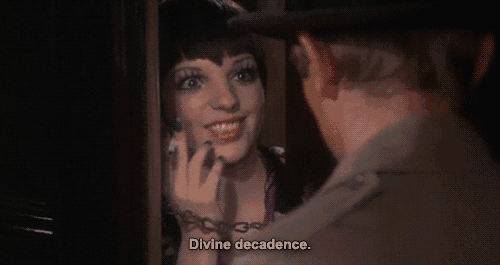Glenn here helping out with the post-ceremony rush. The highlight of last night’s Oscars was surely the six wins for Mad Max: Fury Road. That haul solidified its place as not just one of the most successful Oscar titles of all time, but no doubt the strangest, too.

We may all say that most people were predicting at least four of five of those, but the path to those six wins has been rather extraordinary in the truest definition of that word. Who among us a year ago truly could have predicted that we would be here a year later celebrating six Oscars to a movie about a renegade road warrior, an amputee heroine, and a group of sex slaves rising up against an evil warlord in a post-apocalyptic future with the aide of a gang of elderly motorcycle ladies? While we can be disappointed – very disappointed – that they didn’t add a seventh for George Miller’s direction, any movie winning six golden statues is not only a rarity, but a moment to be extremely proud of so hats off to the team behind Max. It won as many awards as the last two best picture winners combined and it doubled the amount of awards of the next highest winner (The Revenant) on its big night. You done good, Max! May more films like you spring forth from your imposing shadow.
Mad Max: Fury Road joins some fine company, with only 26 films having ever won more awards. 26 over 88 years ! More impressive still, is that Miller’s post-apocalyptic action spectacle is a member of an even smaller collective of only five films to have won half a dozen golden statues without a Best Picture prize to go with them. It’s an interesting quintet to say the least.
The five classics after the jump...
Cabaret (1972)
WON – director, actress, supporting actor, editing, cinematography, art direction, sound, adapted score.
NOMINATED – picture, adapted screenplay
The granddaddy of films that won big, but failed at the final hurdle is perhaps a film that it is very hard to feel sorry for. As if simply winning eight wasn’t enough, it lost the top prize to none other than The Godfather, a film hailed by many as one of few greatest films of all time, which won only three. You or I may go with Bob Fosse’s musical as the better film, but I’m kind of glad they didn’t – can you imagine the incessant dude complaining about Coppola’s film losing to one of those damn musicals? Hard to think anybody seeing those eight wins and dismissing it just because it missed best picture. Those eight speak volumes.

Gravity (2013)
WON – director, editing, cinematography, original music, sound editing, sound mixing, visual effects
NOMINATED – picture, actress, production design
In all the hubbub around this year’s #OscarsSoWhite controversy, a lot of people pointed to 12 Years a Slave's win as proof that there isn’t a significant problem within the Academy. But it’s perhaps worth questioning why a period film – ostensibly the kind that sweeps technical categories while something smaller wins best picture – couldn’t even beat the likes of Baz Luhrmann’s The Great Gatsby to a costume or production design award, only taking home three statues. Was its best picture win a moment of duty calling after all? Still, when it comes to Gravity, it’s hard to deny what attracted so many votes in the tech categories, not least of which was Emmanuel Lubezi's cinematography which starting the ball rolling on his incredible hat trick of three consecutive cinematography Oscars.

Star Wars (1977)
WON – editing, original score, art direction, costume, sound, visual effects, sound effects (special achievement)
NOMINATED – picture, director, original screenplay, supporting actor
Winner of six awards, plus a special seventh for Ben Burtt’s sound effects (now what we know as sound editing, a special achievement Oscar that Star Wars shared with Close Encounters of the Third Kind), Star Wars sort of feels like the prototype of films that people talk about when they talk about losing best picture due to perceived genre bias. What a lot of people seem to forget is that it was nominated in the same year as Woody Allen’s Annie Hall and would we really take that film’s statue away? Nearly 40 years later and The Force Awakens lost all but one of its five nominations to Mad Max: Fury Road, a film it shares this unique place in history list-making with.

A Place in the Sun (1951)
WON – director, screenplay, editing, cinematography (b+w), costume (b+w), music
NOMINATED – picture, actor, actress
No doubt enhanced by being from a time when many categories had colour as well as black and white subs, George Stevens’ divine drama A Place in the Sun feels like an oddity among the list. Still, it’s wonderful to see a film such as this being forced into people statistics so I’m not going to complain. 1951’s big winner, An American in Paris, also won six although its arguable as to whether either ought to have won when A Streetcar Named Desire was right there (it won four).

Mad Max: Fury Road (2015)
WON - editing, costume, production design, makeup and hairstyling, sound mixing, sound editing
NOMINATED - picture, director, cinematography, visual effects
How close George Miller's movie came to wins in the rest of its categories will remain forever unknown, but hopefully it has helped open a door - even it it's just slightly ajar - for other films with its gonzo genre-appeal to be taken more seriously by the Academy. Hopefully it will inspire studios to mount future campaigns that may have previously been deemed too risky to invest in. And I have no doubt whatsoever that it's legacy will last far beyond mere statistics. And as for the speeches? Don't you quite like knowing that many of the people that helped make such a bonkers movie are themselves rather nutty? It's rather fitting.
For reals though.
Ain't that the truth.

